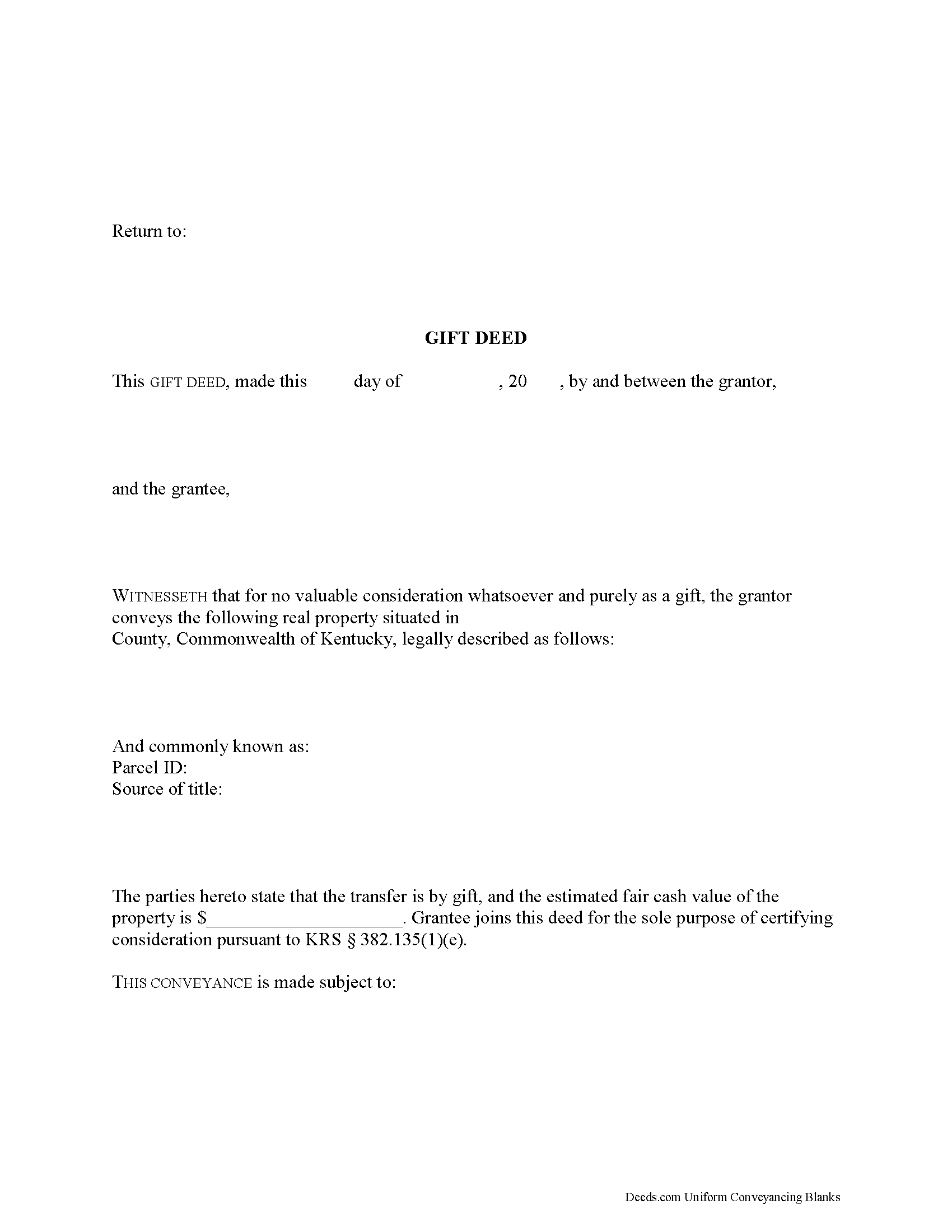Download Kentucky Gift Deed Forms
Kentucky Gift Deed

Gift deeds convey title to real property from one party to another with no exchange of consideration, monetary or otherwise. Often used to transfer property between family members or to gift property as a charitable act or donation, these conveyances occur during the grantor's lifetime. Gift deeds must contain language that explicitly states that no consideration is expected or required. Ambiguous language, or references to any type of consideration, can make the gift deed contestable in court.
A lawful gift deed includes the grantor's full name and marital status, as well as the grantee's full name, marital status, vesting information, and mailing address. Vesting describes how the grantee holds title to the property. Generally, real property is owned in either sole ownership or co-ownership. For Kentucky residential property, the primary methods for holding title are tenancy in common, joint tenancy, and tenancy by the entirety. An estate conveyed to two or more persons is considered a tenancy in common, unless a joint tenancy is specified. An estate conveyed to a husband and wife vests as a tenancy in common, unless a tenancy by the entirety with full right of survivorship is expressly stated (KRS 381.050).
As with any conveyance of realty, a gift deed requires a complete legal description of the parcel. Recite the prior deed reference to maintain a clear chain of title, and detail any restrictions associated with the property.
In Kentucky, most conveyances of real property require a statement of consideration. A transfer tax is levied based on the actual consideration stated and paid. When real property is gifted from one party to another and no consideration is exchanged, tax is paid on the property's estimated value, so that amount must be stated within the instrument (KRS 382.135(1)(e)). "Value," as defined by KRS 142.050(1)(b)(2), is "the estimated price the property would bring in an open market and under the then prevailing market conditions in a sale between a willing seller and a willing buyer, both conversant with the property and with prevailing general price levels." Each grantee must join in signing to certify the consideration statement.
The deed must be signed by both the grantor and grantee and acknowledged by an authorized individual. All signatures must be original. In Kentucky, deeds also require a preparation statement, comprised of the document preparer's name, address, and signature (KRS 382.335(1)). Instruments also require the name and address of the person to receive future tax statements on the subject property (KRS 382.135(1)(d)).
Record the completed gift deed with the clerk's office in the county where the subject property is located. Contact the same office to confirm recording fees and accepted forms of payment.
With gifts of real property, the recipient of the gift (grantee or donee) is not required to declare the amount of the gift as income, but if the property accrues income after the transaction, the grantee is responsible for paying the requisite state and federal income tax [1].
In Kentucky, there is no state gift tax, but gifts of real property are subject to the federal gift tax. The person or entity making the gift (grantor or donor) is responsible for paying the federal gift tax; however, if the donor does not pay the gift tax, the donee (grantee) will be held liable [1]. In accordance with federal law, individuals are permitted an annual exclusion of $15,000 on gifts. This means that gifts valued below $15,000 do not require a federal gift tax return (Form 709). However, if the gift's value could possibly be disputed by the IRS, a donor may benefit from filing a Form 709 [2].
This article is provided for informational purposes only and is not a substitute for the advice of an attorney. Contact a Kentucky lawyer with any questions about gift deeds or other matters related to the transfer of real property.
[1] http://msuextension.org/publications/FamilyFinancialManagement/MT199105HR.pdf
[2] https://www.irs.gov/businesses/small-businesses-self-employed/frequently-asked-questions-on-gift-taxes
(Kentucky Gift Deed Package includes form, guidelines, and completed example)